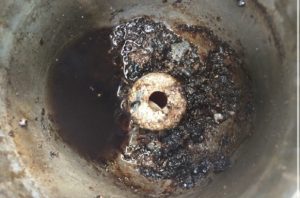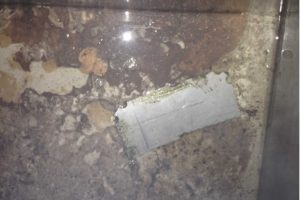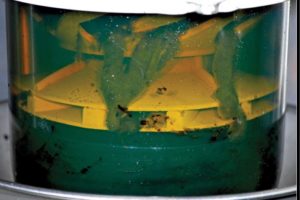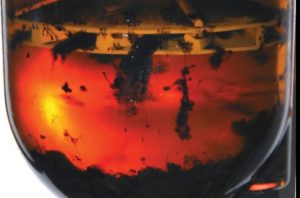Diesel fuel can be referred to as any liquid fuel that is specifically designed for use in an internal combustion engine using the heat created by mechanical compression of the air in the cylinder to ignite a calibrated measurement of fuel.
These engines, called compression-ignition (CI) engines rely on the fuel to be within a specific range of a specific quality for reliable, clean, economic combustion.
Diesel is derived not only from petroleum, but now commercially in a broad range of biomass, animal fats, biogas, and coal liquefaction sources, some of these having been in use as a source for over 100 years.
All diesel fuels have common problems that dramatically affect the compression-ignition engine: algae, microbes, yeasts and water contamination.
With the ideal temperature for growth being between 10 and 50 degrees centigrade, ALL diesel fuels, no matter their source, decline in quality at differing rates, some surprisingly rapidly.
For example, microbial growth in biodiesel is a primary cause of contamination during fuel handling and storage. Being hygroscopic, it readily absorbs atmospheric moisture, and has a low oxidisation stability resulting in its lowered ability to resist chemical changes in long term storage. Notably, the introduced moisture reduces the high lubrication ability of the diesel fuel resulting in increased engine wear.
Bacteria in a filter bowl.
These microbial colonies are formed and live at the interface of fuel and water growing rapidly in warmer temperatures. They even grow in extreme cold weather areas resulting in Microbiologically Influenced Corrosion (MIC) when fuel tank heaters are installed.
As fuel deliveries are from a variety of sources globally, the fuels experience atmospheric and ocean seawater temperature variations causing the expansion and contraction of the liquid. This fuel is then transferred into large shoreside storage facilities exposed to the sun’s radiant heat, weather and remnants of previous fuel deliveries laying within tanks and piping. The quality of your fuel and tanks can be (and most likely is) unknown. Even good quality, clean, perfect fuel turns “stale” quickly starting a rapid degradation of the entire fuel system from tank to exhaust. If you have ever had a sooty transom, that can be an indication the fuel combustion, and probably the fuel quality may not be optimal.
Bottom of an aluminium boat tank with a layer of yeasts and bacteria.
This unique PFM treatment of the hydrocarbon fuel at a molecular level assists in the removal of risks from bacteria and moisture. The treatment creates a molecular structure that is more readily ignited and used in combustion, resulting in reduced bacterial levels, moisture content, emissions (NOx and SOx).
Proven Fuel Management LTD has developed and manufactures a patented technology that offers a unique and cost-effective method for effectively treating existing contamination issues and reducing associated risks over time. Implementation and installation of the system and technology are straightforward.
The reduction of bacterial levels and moisture resulting from the technology is crucial for safeguarding storage tanks in various ways, including:
Eliminating bacteria that cause fuel tank leaks.
Minimising damage caused by condensation moisture.
Preventing chemical additives.
Preventing fuel oxidation, which reduces available combustion energy.
Ensuring a consistently high standard of fuel availability on demand.
The technology also provides benefits for fuel tanks, lines, and filters, such as:
Prevention of “wax” build-ups in fuel lines and filter housings.
Avoidance of filter blockages caused by bacteria.
Reduction of water bowl level alarms.
Additionally, the technology offers advantages for engines and exhaust systems, including:
Prevention of carbon build-up in turbos and exhaust valves.
Mitigation of cylinder wash contaminations, which can lead to oil and engine component deterioration.
Minimisation of fuel system wear, such as damage to injectors and high-pressure pumps.
Reduction of visual particulate matter.
Contact: ONBOARD ELECTRICAL
Shed N4B, The Boat Works, 199 Beattie Road Coomera
www.onboardelectrical.com.au Ph:(07) 5501 5577
Peter Whiteley Mobile: 0452 046 424
email: peter@pfmblue.com www.pfmblue.com
Published in print July-September 2023



































